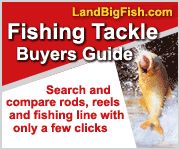Fishing License: Your Ticket to Fun
Written by Weekend Angler on April 22nd, 2009No matter where you fish in the United States or many other countries, you will need to have a fishing license. Although there are some federal permit requirement for fishing coast waters for certain kinds of fish, there is no nationwide license. Sports fishing licenses in the US are issued by individual states. This make a lot sense given that each state has distinctly different ecological environments.
The license is one of the reasons why we still enjoy an abundance of fish in our waters. Despite the rising number of recreational and commercial fishermen, the fish population is still being preserved, maintained, and sustained. This is because of the state laws deter overfishing. These laws are part of a complex system to manage our natural resources, monitor fishing activities, reduce the ecological impact of fishing as much as possible, and keep the fish and the waters alive for the next generation. That is why fishing licenses are important and fishing laws must be followed.
The thing to consider when getting a license is that different areas have different regulations. Fees vary according to the types of fishing you apply for too. Sport fishing will have quite different fees and requirements from commercial fishing. Saltwater and freshwater fishing may be also be different. Some areas will offer free fishing days. The fees collected are used in different ways, according to which place you are fishing on. These are usually channeled back to programs for improving the fishing industry.
 You can get licenses and permits online or at a local bait and tackle shop. Even if you get a license offline, it’s a good idea to check online to see if there are new rules and regulations. Going online to get your annual or lifetime license is very easy. You do not have to go to an office and instead complete forms via the web and pay with your credit card. Go to your favorite search engine and enter “state-name fishing license.”
You can get licenses and permits online or at a local bait and tackle shop. Even if you get a license offline, it’s a good idea to check online to see if there are new rules and regulations. Going online to get your annual or lifetime license is very easy. You do not have to go to an office and instead complete forms via the web and pay with your credit card. Go to your favorite search engine and enter “state-name fishing license.”
By the way both residents and non-residents are required to have licenses before they start fishing. In some states you can get a temporary or short term license if you are vacationing. Often children under 16 are not required to have a license, but they are required to follow the state fishing regulations. Some states offer a discounted license to seniors.
You are responsible for knowing and following state fishing regulations. Check open season dates, minimum legal size limits, daily creel size limits, bait restrictions, schedules and boundaries. All these are important. In this way we can help each other and our environment while enjoying our favorite pastime or sport for years to come.















